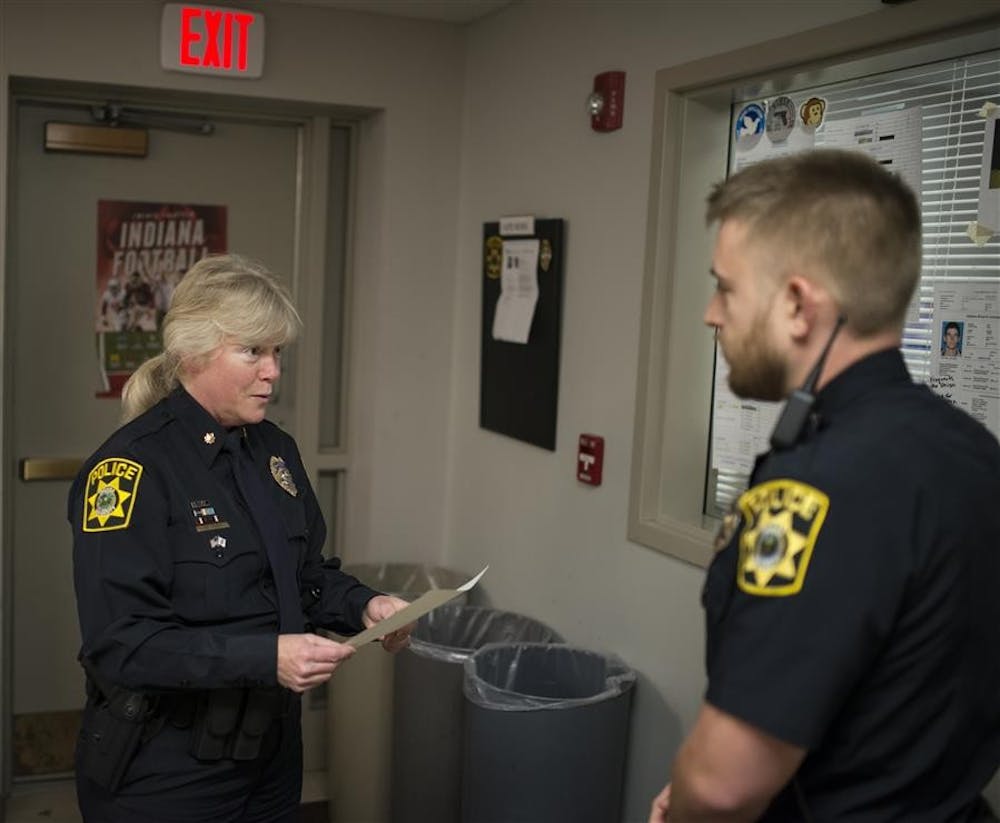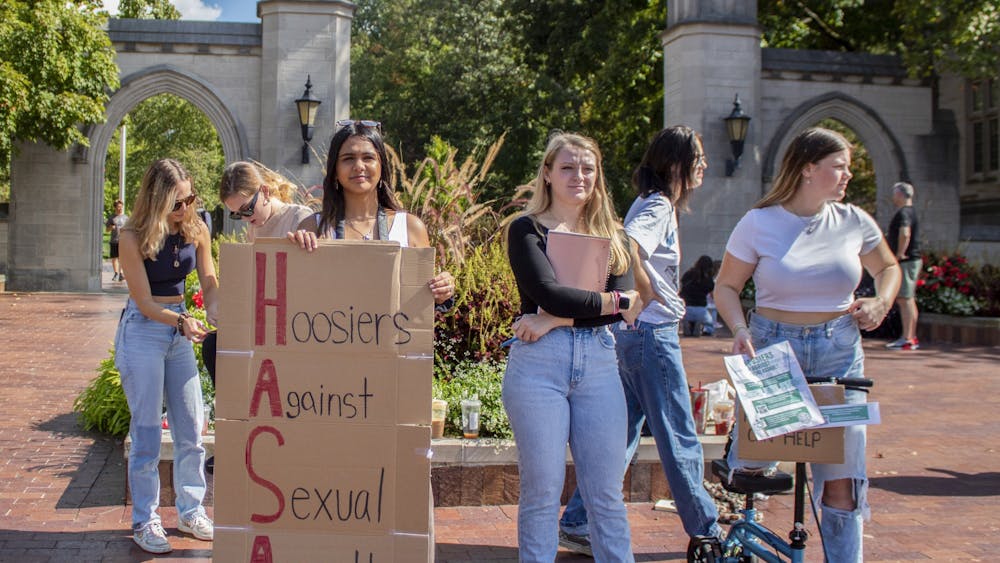Hidden between the piles of papers and reports, Laury Flint’s new IU Police Department Chief badge laid on her desk.
She’s already accepted her role as police chief, but her new badge is still in its packaging, and her deputy badge remains pinned to her uniform.
It didn’t feel quite right to wear the chief’s badge, Flint said. It’s not about the title — she’s already been doing the job for the past eight months.
IU Director of Public Safety Jerry Minger and Provost Lauren Robel announced the appointment of Laury Flint as campus police chief Monday. As the new chief, Flint oversees all law enforcement on campus, a position she officially began serving on Nov. 1.
“We are extremely fortunate to have a person like Laury ready to step into a position so critical to the safety of the IUB campus,” Minger said in a press release.
In her eight months as interim police chief, Flint has handled two student deaths, a campus-wide alert following a knife fight and a student strike.
Prior to being appointed police chief, Flint served as Deputy Chief of Police to the late Chief Keith Cash.
In March, Cash died of a heart
defect, and Flint was next in line to fill his place.
She assumed the role of interim police chief. Although her duties and responsibilities didn’t change much, she became the face of IUPD, the mediator between law enforcement and departments across campus.
For years, she had worked with Cash, but she now had to take on his role as well as her own.
She and Cash had a great working relationship, Flint said. They complemented each other — he was the thinker and she was the doer.
“He liked to do all of the press releases and be in front of the media, and he was good at that,” she said. “I was more the doer. I deal with the public on a little more of a personal level.”
* * *
Flint knew from a young age that she wanted to become a police officer.
“I think it was probably around eight years old that I decided this is what I wanted to do,” Flint said.
She said her parents did not necessarily want her to go into law enforcement because of the dangerous nature of the field.
“I was their little girl,” Flint said. “Police work was not necessarily something they wanted to see me get into.”
Her parents sent her to the Indiana State Police summer career camp when she was in high school, hoping it would dissuade her from pursing a career in law enforcement.
“They wake you up in the middle of the night with sirens going,” Flint said. “My parents thought that if I went to this that it might change my mind, but it just reinforced that this was something that I wanted to do.”
Flint attended IU in the fall of 1978 and has been here ever since. She majored in criminal justice.
During her time as a student, Flint worked as a part-time officer for IUPD and was offered a full-time position in January of 1982. Flint said she had not considered working at IUPD full-time before she was offered the position.
“This was something I thought was going to be a stepping stone,” she said.
As she began her career in law enforcement, Flint anticipated she might have a harder time proving herself than a man in the same position.
“I think people were watching me closely to see how I would react to situations,” Flint said. “I was eventually just treated like one of the guys.”
The first promotion Flint applied for was a lieutenant’s position with IUPD, even though a sergeant’s position would have been her natural next step.
Flint said she applied for a lieutenant’s position because she did not feel comfortable being the immediate supervisor to the people she had worked with for 20 years. She said she was told to apply for the sergeant’s position as well.
“They did end up offering me a sergeant’s position,” Flint said. “I joke that I was sergeant for a day.”
At the same time IUPD offered her the sergeant’s position, Tom Lee, now a captain, was promoted to lieutenant.
IUPD temporarily assigned Flint to Lee’s position when he left soon after his promotion to serve in Iraq, and when he returned there was another lieutenant position open for Flint to assume permanently.
Flint remained a lieutenant at IUPD until Cash became police chief in 2010.
“There was a lot of change when Keith took chief, so I kind of skipped over the captain’s position and took the deputy chief position,” Flint said. “It is just sort of the way it worked out.”
* * *
Part of her responsibility now as chief is to work with university departments that deal directly with students and enforce disciplinary action or intervention.
“Even if discretion says a person doesn’t need to be arrested or taken to jail for what they have done, we have the additional benefit of being able to take it to the Dean of Students, and he can determine if this person needs University punishment,” she said.
Flint said she does not think students realize how much people care about them behind the scenes.
“I think I was a little idealistic when I started this job and probably a little naïve, and some of the times you have to help people that don’t want to be helped,” she said.
Mark Bruhn, IU associate vice president for public safety and institutional assurance, said he thinks Flint will fulfill her responsibilities well.
“Along with Laury’s experience, knowledge and expertise in public safety and management, she has the mindset necessary to act and react in a university environment which presents unique challenges,” Bruhn said in a press release.
Flint said the beauty of her job is that she never knows what is going to happen next. She said it is 99 percent routine.
“That one percent is what keeps you going to the next time,” she said.
* * *
Just this year, Flint and IUPD have experienced a multitude of high-profile incidents. She said the death of freshman Rachael Fiege, for example, was a heartbreaking situation, but it also raised awareness of amnesty programs like the Lifeline Law.
“When Rachael Fiege died there was an awful lot of news coverage,” Flint said. “I’ve seen a lot more people stepping up if they think that someone is in trouble and calling (911), even if they’ve been doing something that they shouldn’t have been doing, too.”
Most recently, Flint was responsible for responding to a knife-fight which left an armed man at large on campus. She said determining who exactly was in danger and sorting through witness information was the most difficult part of the situation.
Flint said the IU Protect website, which provides updated information on emergency situations at IU, crashed due to increased web traffic.
This led to an overflow of phone calls to IUPD from concerned parents, who were also alerted of the incident.
In the future, Flint said, she hopes to make clear to concerned individuals that IUPD will update the public as information is made available.
“We had an after action review and discussed what went well and what needs to be improved for next time,” Flint said. “We want to make sure that the information we put out is as accurate as it can be with the information that we have at the time.”
In the near future, Flint hopes to clearly define the roles and job responsibilities for her officers.
“I want to get people in place first and get responsibilities lined out, then we’ll start working on the big picture,” Flint said. “I just want this to be a place that people are proud of.”
Although Flint is not wearing her badge immediately after being named chief, she said she also wasn’t wearing the badge for the past eight months when she was doing the same job.
“It’s not about the title,” she said. “It is about the work I think that we do here, all of us.”
Follow reporter Rachel Rapp on Twitter @rachrapp517.
Flint steps into IU police chief role

Get stories like this in your inbox
Subscribe




